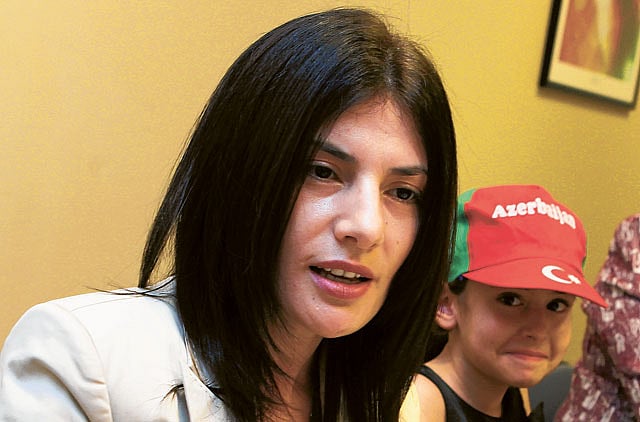Azerbaijan expats fly the flag in the UAE
Don't worry, by Saturday's grand finale of the Eurovision Song Contest in Baku, you'll know all about Azerbaijan

The UAE's Azerbaijani community is going all-out to promote their country's hosting of the annual Eurovision Song Contest.
The rules of the 56-year-old contest, which has produced such illustrious winners as Abba and Celine Dion, dictate that each year's winner gets to host the contest the following year.
"The Azerbaijani community has held two meetings so far and we decided to pass on as much information as possible to companies, colleagues and friends", says Samer Imanov, a member of the Azerbaijani community in the UAE.
Imanov, along with his compatriots, has been actively handing out brochures, magazines, calendars and booklets in various languages designed specially to promote the event and to spread awareness about Azerbaijan and Baku, its capital and host of this year's event. Two semi-finals are being held this week, which will culminate in the grand finale on Saturday.
Khalida Mammadova, 36, who works with a management company in Dubai, says that she keenly follows the contest on TV and is travelling to Baku to watch the semi-finals and the grand finale. She believes that Azerbaijan will gain a lot through this opportunity to host Eurovision.
Introduction to the world
"Mostly people don't even know that such a country [Azerbaijan] exists", she says. "So when I speak about [Eurovision], I give a little information about the culture and history of Azerbaijan as well. It is about music but also a way to introduce Azerbaijan to the world."
A total of 42 countries have confirmed their participation this year from the eligible countries, who are all members of the European Broadcasting Union. Representing Azerbaijan is singer Sabina Babayeva, who has the complete support of the community behind her.
"We watch the event as a family on Ictimai TV", says Samir Safarov, who works with a real estate investment firm.
The Azerbaijani authorities had hoped that hosting Eurovision would boost the energy-rich ex-Soviet state's image, but it has attracted publicity over allegations of human rights abuses which threaten a potential PR disaster.
"This is part of a broader diplomatic charm offensive to put Azerbaijan on the map, but if you get a lot of attention, you are also much more open to criticism," said Lawrence Sheets, Caucasus project director at the International Crisis Group think-tank.
Azerbaijani pop duo Eldar & Nigar made history last year by becoming the first act from that country to win the contest, with their song Running Scared.
"The event is a way for an intercultural dialogue", says Aydan Zeynalova, 21. "Music is an important part of it, but it is also a way to show the people about the Azerbaijani heritage and culture."
Spreading information about the event is done mainly through word of mouth, she added. "I got a lot of my friends to know about it by talking to them about the competition."
— With inputs from AP
How eurovision works
- All participating countries in the contest must be active members of the European Broadcasting Union.
- Winners of the Eurovision contest host the contest the following year.
- There are two semi-final rounds: 10 countries from each round qualify for the final.
- These 20 countries are then joined by six other countries, including the host country (Azerbaijan this year) and the "Big Five" — the UK, France, Italy, Spain and Germany — which are pre-qualified, making the total number of countries qualifying for the finals 26.
- The rules of voting dictate that after all performances, each country ranks all their respective entries and assigns points based on the votes. A total of 12 points go to their favourite performing country, followed by 10 points to their second, and eight points to 1 point for their third to 10th favourites. Pre-decided professional juries from each country also cast their votes, using the same points system. Each result counts for 50 per cent of the total. Once the points of the public and the juries are merged per country, the ten countries with the highest points qualify for the finals.
- Viewers from each country can vote up to 20 times by making a phone call or sending in an SMS, though they cannot vote for their own country.
- The voting system in the finals is similar to that of the semi-finals. Once the performances begin, viewers from the member countries as well as professional juries cast their votes.
- Once the points for the number of votes are allocated and tallied per country, the country with the most points is declared the winner.
Did you know?
For her performance at the grand finale, Azerbaijan's entry Sabina Babayeva will perform When the Music Dies and will be joined by singer Alim Qasimov, who will bring in a traditional element to her performance.
"She has already performed in many other music contests", says Khalida Mammadova, a fan. "She will be very good."
Sign up for the Daily Briefing
Get the latest news and updates straight to your inbox
Network Links
GN StoreDownload our app
© Al Nisr Publishing LLC 2025. All rights reserved.